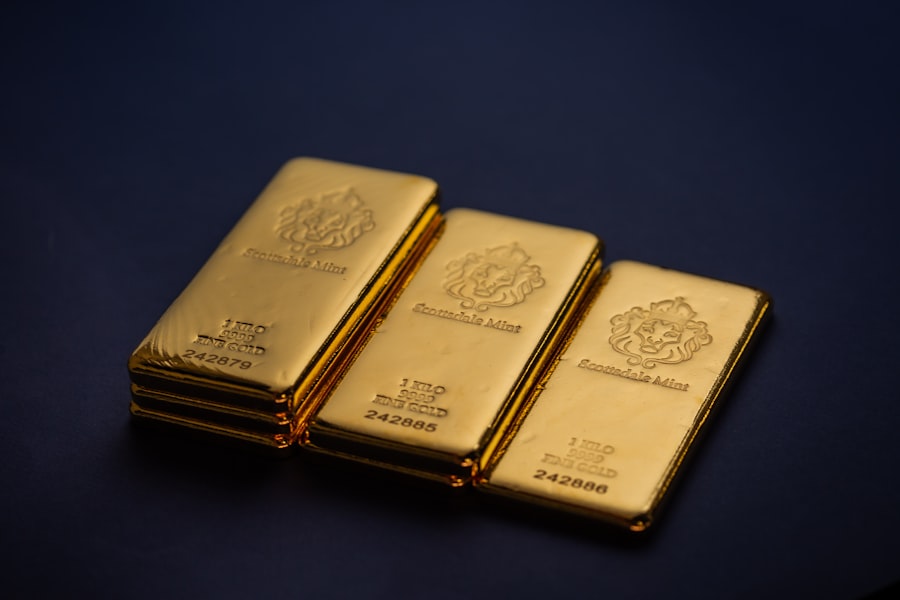The gold reserves of the Soviet Union have long been a subject of intrigue and analysis, representing not only a significant financial asset but also a symbol of the nation’s economic strength. Gold has historically been viewed as a safe haven during times of economic uncertainty, and the USSR was no exception. By the late 20th century, the Soviet Union had amassed substantial gold reserves, which were seen as a cornerstone of its economic stability.
These reserves were not merely a reflection of wealth; they were integral to the Soviet Union’s ability to engage in international trade, maintain currency stability, and project power on the global stage. The importance of gold reserves in the Soviet economy cannot be overstated. They served as a buffer against inflation and currency devaluation, providing a sense of security to both the government and its citizens.
As the world moved towards a more interconnected economic landscape, the role of these reserves became even more critical. However, as the 1990s approached, the political and economic landscape of the Soviet Union began to shift dramatically, leading to a depletion of these vital reserves that would have far-reaching consequences.
Key Takeaways
- The depletion of USSR gold reserves in 1990 critically weakened the Soviet economy and accelerated its collapse.
- International reactions included increased economic uncertainty and shifts in global financial markets.
- Efforts to stabilize the Soviet economy were largely unsuccessful, leading to significant political and social turmoil.
- The crisis highlighted the risks of overreliance on gold reserves and poor economic management.
- The legacy of the depletion influenced post-Soviet economic policies and global economic dynamics.
The Depletion of USSR Gold Reserves in 1990
The year 1990 marked a pivotal moment in the history of the Soviet Union’s gold reserves. As the country faced mounting internal pressures and external challenges, its gold reserves began to dwindle at an alarming rate. The depletion was not merely a result of poor management or economic miscalculations; it was also indicative of the broader systemic issues plaguing the Soviet economy.
The government found itself in a precarious position, forced to liquidate gold reserves to finance its operations and address growing social unrest. This depletion was exacerbated by a series of political upheavals and economic reforms that swept through the nation. The introduction of perestroika and glasnost aimed to revitalize the economy but inadvertently led to increased instability.
As citizens grew disillusioned with the government, demands for reform intensified, prompting leaders to tap into gold reserves as a means of maintaining control.
Impact on the Soviet Economy

The depletion of gold reserves had profound implications for the Soviet economy. As these reserves dwindled, so too did the government’s ability to stabilize the ruble, leading to rampant inflation and a loss of purchasing power for ordinary citizens. The economy, already burdened by inefficiencies and bureaucratic red tape, faced an existential crisis as essential goods became scarce and prices soared.
The once-mighty industrial base began to falter under the weight of economic mismanagement and declining foreign investment. Moreover, the depletion of gold reserves eroded trust in the government’s ability to manage the economy effectively. Citizens who had relied on state assurances found themselves grappling with uncertainty and fear for their financial futures.
The social contract between the government and its people began to fray, as discontent simmered beneath the surface. The economic turmoil not only affected individuals but also had ripple effects throughout various sectors, leading to widespread unemployment and a decline in living standards.
International Reactions to USSR Gold Reserves Depletion
| Country | Reaction | Impact on International Relations | Economic Measures Taken | Year |
|---|---|---|---|---|
| United States | Increased scrutiny on Soviet economic stability | Heightened Cold War tensions | Imposed stricter trade controls and sanctions | 1980s |
| United Kingdom | Concern over global gold market fluctuations | Strengthened alliances with NATO partners | Monitored gold reserves and adjusted monetary policies | 1980s |
| China | Viewed as an opportunity to expand influence | Improved diplomatic relations with Western countries | Increased gold purchases and diversified reserves | 1980s |
| France | Expressed concerns about economic stability in Eastern Europe | Supported European Community economic policies | Enhanced gold reserve management | 1980s |
| Japan | Monitored impact on global commodity markets | Maintained cautious trade relations with USSR | Adjusted import-export strategies | 1980s |
The international community closely monitored the situation in the Soviet Union as its gold reserves dwindled. Many foreign governments and financial institutions expressed concern over the implications for global stability. The depletion raised alarms about the potential for economic collapse, which could have far-reaching consequences beyond Soviet borders.
Analysts speculated on how this would affect trade relations, currency values, and geopolitical dynamics. In response to these developments, some nations began to reassess their diplomatic and economic ties with the USSR. Countries that had previously viewed the Soviet Union as a formidable power started to question its viability as an economic partner.
The depletion of gold reserves served as a stark reminder that even superpowers could face dire financial crises, prompting a reevaluation of alliances and trade agreements.
Effects on the Global Economy
The depletion of USSR gold reserves did not occur in isolation; it had significant implications for the global economy as well. As one of the largest holders of gold, any significant changes in Soviet reserves could influence global gold prices and market stability. The uncertainty surrounding the Soviet economy led to fluctuations in commodity markets, as investors reacted to news of declining reserves and potential instability.
Additionally, the crisis prompted other nations to reconsider their own gold holdings and monetary policies. Countries that had previously relied on gold as a stabilizing asset began exploring alternative strategies for managing their economies. This shift marked a transition towards more diversified financial systems, as nations sought to mitigate risks associated with over-reliance on any single asset class.
The global economic landscape was forever altered as countries adapted to new realities shaped by the events unfolding in the Soviet Union.
Attempts to Stabilize the Soviet Economy

In response to the crisis precipitated by the depletion of gold reserves, Soviet leaders undertook various measures aimed at stabilizing the economy. These efforts included implementing austerity measures, seeking international loans, and attempting to reform state-owned enterprises. However, these initiatives often met with resistance from both within the government and among the populace, who were increasingly disillusioned with leadership.
The introduction of market-oriented reforms was particularly contentious. While some policymakers recognized that transitioning towards a more market-driven economy was essential for recovery, others clung to traditional socialist principles. This ideological divide hampered effective decision-making and delayed necessary reforms.
As a result, attempts to stabilize the economy often fell short, leading to further deterioration in living conditions for many citizens.
Political Fallout from USSR Gold Reserves Depletion
The depletion of gold reserves had significant political ramifications within the Soviet Union. As economic conditions worsened, public discontent grew, leading to widespread protests and calls for reform. The government’s inability to address these grievances effectively eroded its legitimacy in the eyes of many citizens.
Political factions began to emerge, each advocating for different approaches to governance and economic management. The crisis also accelerated calls for independence among various republics within the Soviet Union. As central authority weakened due to economic turmoil, nationalist movements gained momentum, seeking greater autonomy or outright independence from Moscow’s control.
This fragmentation further complicated efforts to stabilize the economy and maintain political cohesion, ultimately contributing to the dissolution of the Soviet Union itself.
Social Consequences of the Economic Crisis
The social consequences of the economic crisis resulting from depleted gold reserves were profound and far-reaching. As living standards plummeted and basic necessities became increasingly scarce, citizens faced unprecedented challenges in their daily lives. The once-reliable social safety net began to fray, leaving many vulnerable individuals without access to essential services such as healthcare and education.
Moreover, social unrest became more prevalent as frustration boiled over into protests and demonstrations against government policies. Citizens who had once placed their faith in state institutions now found themselves questioning their leaders’ competence and intentions. This growing disillusionment fostered an environment ripe for change but also led to increased polarization within society as different groups sought varying solutions to their shared plight.
Lessons Learned from USSR Gold Reserves Depletion
The depletion of USSR gold reserves offers valuable lessons for contemporary economies grappling with similar challenges. One key takeaway is the importance of prudent financial management and diversification of assets. Relying too heavily on any single resource can leave an economy vulnerable to shocks that may arise from political or social upheaval.
Additionally, this historical episode underscores the need for transparency and accountability in governance. When citizens lose faith in their leaders’ ability to manage resources effectively, it can lead to widespread discontent and instability. Building trust through open communication and responsible stewardship is essential for maintaining social cohesion during times of crisis.
Legacy of the Depletion of USSR Gold Reserves
The legacy of the depletion of USSR gold reserves continues to resonate today, shaping discussions around economic policy and governance in post-Soviet states. The events surrounding this period serve as a cautionary tale about the dangers of mismanagement and complacency in times of prosperity. As nations navigate complex global challenges, they must remain vigilant against similar pitfalls that could jeopardize their economic stability.
Furthermore, this legacy has influenced how countries approach their own gold reserves and monetary policies in an increasingly interconnected world. Many nations have sought to learn from past mistakes by diversifying their assets and adopting more flexible economic strategies that can withstand external shocks.
The Aftermath of USSR Gold Reserves Depletion
In conclusion, the depletion of USSR gold reserves marked a turning point not only for the Soviet Union but also for global economics and politics at large. The consequences were felt across multiple dimensions—economically, politically, socially—and continue to inform contemporary discussions about resource management and governance today. As nations reflect on this historical episode, they are reminded that sound financial practices and responsive leadership are crucial for navigating uncertainty in an ever-evolving world.
The aftermath of this depletion serves as both a warning and an opportunity for growth; it highlights how interconnected economies can be affected by internal crises while also emphasizing resilience through adaptation and reform. Ultimately, understanding this complex history is essential for fostering sustainable development in today’s global landscape.
In the context of the depletion of gold reserves in the USSR during the 1990s, it is interesting to explore the broader economic implications of this event. A related article that delves into the financial strategies employed by the USSR during this tumultuous period can be found here. This article provides insights into how the depletion of gold reserves affected the Soviet economy and its eventual transition into the post-Soviet era.
WATCH THIS 🛑 The $10 Trillion Lie: How The USSR Was Bankrupt 10 Years Before It Fell
FAQs
What were the USSR gold reserves in 1990?
In 1990, the USSR held significant gold reserves, estimated to be around 2,000 metric tons, making it one of the largest gold holders in the world at that time.
Why did the USSR’s gold reserves deplete in 1990?
The depletion of the USSR’s gold reserves in 1990 was primarily due to economic difficulties, including the need to support the ruble, pay off foreign debts, and finance imports during a period of economic crisis and political instability.
How did the depletion of gold reserves affect the Soviet economy?
The reduction in gold reserves weakened the USSR’s financial stability, limiting its ability to back its currency and secure international loans, which contributed to the overall economic decline leading up to the dissolution of the Soviet Union.
What role did gold reserves play in the USSR’s monetary policy?
Gold reserves were a critical component of the USSR’s monetary policy, serving as a guarantee for the ruble and as a means to support international trade and financial obligations.
Did the USSR sell its gold reserves in 1990?
Yes, the USSR sold portions of its gold reserves in 1990 to generate hard currency needed to stabilize the economy and meet external financial commitments.
What happened to the USSR’s gold reserves after 1990?
After 1990 and the subsequent dissolution of the Soviet Union in 1991, the gold reserves were inherited by the Russian Federation and other successor states, with Russia becoming the primary custodian of the former USSR’s gold assets.
How did the depletion of gold reserves relate to the collapse of the Soviet Union?
The depletion of gold reserves was both a symptom and a contributing factor to the economic crisis that undermined the Soviet Union’s financial system, exacerbating economic instability that played a role in the eventual collapse of the USSR.
